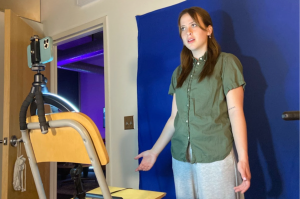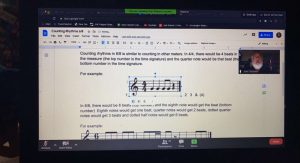Struggling with debt is nothing new to people, especially young adults who enroll in college. Taking on debt to fund college is one of the most common ways people accumulate debt. While the Biden administration has tried to tackle the issue of student loan debt, young adults are accumulating more debt caused by inflation and the rise in the cost of living
The Pew Research center report conducted that, “The typical household income of college-educated student debtors ($57,941) is nearly twice that of those who do not have a bachelor’s degree ($32,528).” A record high of student loan debt in the United States totaling to $1.75 trillion in the second quarter of 2022. Which grows 6 times faster than the nation’s economy.
Nursing student Tara McIvor is, like many Americans, trying to pay back her student loan debt, which is a little over $40,000. Like most who are dealing with debt, she is worried about paying back student loans. “It’s ironic how I need to take out loans to go to college, to get a career that will support myself as an independent adult, all while starting off already in debt to the government,” said McIvor.
It is possible to get debt under control, and that starts with setting goals towards succeeding. “How I worked towards paying off my past debt was setting a personal goal of mine to pay off (X) amount every month and/or I found myself working extra hours when possible to pay off more than I normally would,” said Anthony Cervantes, a 27-year-old IT analyst.
How can we combat student loan debt and other debts we carry into our young adult years? The Debt Collective, a membership-based union for debtors, helps pay off different kinds of debt such as household debt, credit card debt, medical debt, student loans, utilities, payday loans, and more.
Braxton Brewing, spokesperson for The Debt Collective, says the group has raised more than $30 million for debt relief. Brewing explains how much the union has taken on to help individuals. “We have helped a lot of people file borrower defense payments, fill out a closed school discharge with the Department of Education,” he said. “We have done a lot of the very nitty gritty follow up for the Department of Education.”
If you want to cut back student debt and other types of debt here are five tips:
- Before you make a purchase, ask yourself some questions that can help you determine if this item is worth the payout. “Is this a want or a need?”
- Become disciplined with your spending, cut back on certain pleasures. This can be hard for young people, but cutting down on the cost of small things can go a long way!
- Consolidate credit cards into one lump sum. This helps you pay off that debt faster by paying less money to big banks in interest.
- If you receive a bonus, a tax return and/or something similar, plan to make payments on large expenses and/or any bills. This has helped people such as myself may down a large expense to help you get ahead financially.
- Lastly, lay out your monthly reassuring expenses and income such as rent, phone bill, car payment/insurance, utilities and student loan repayment.















Be First to Comment